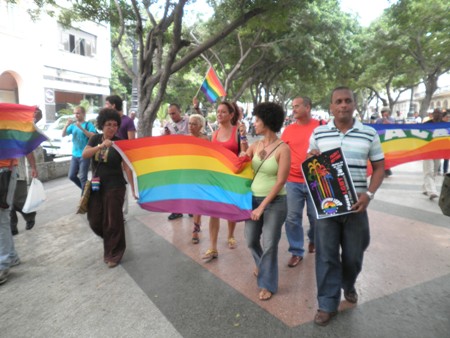
On Tuesday the 28th, at three in the afternoon, the first LGTB (Lesbians, Gays, Transsexuals and Bisexuals) Observatory Walk took place in Havana, along the middle of the central street of the Prado, starting from the corner of Neptune and continuing to the sea. The date selected recalls the massive gay pride march celebrated in New York in 1970 that marked an important victory for these minorities. The parade, of small numbers but peaceful was not interrupted or repressed by the uniformed police force, or by civil agents of the political police who, however, were abundant in the sites adjacent to the popular avenue.
Around twenty members of the independent organization marched down the center of the old Paseo del Prado, waving their multicolored flags and proclaiming the right to freely choose their sexual preferences and opposing discrimination against different minorities. A march of this nature, led by an organization not attached to the official CENESEX led by Mariela Castro, has no antecedents in Cuba, so the small representation achieved in this first edition does not discount its significance, and perhaps in future years it will be exceeded. Surely the fear that dominates vulnerable sectors of society faced with the repressive forces, coupled with a strong social prejudice aimed at these groups, was a decisive factor in the number of witnesses who crowded into the area and the silent multitude formed by both curious homosexuals and heterosexuals unaccustomed to such boldness in our streets, who accompanied the demonstrators from a certain distance and from nearby sites, without openly joining in with the walk. We can not forget that, until recently, homosexuality was fiercely persecuted and harassed by the powers-that-be, that its members continue to be stigmatized and discriminated against in various ways and that, in general, society tends to marginalize those who are different.
The small number of determined demonstrators, however, could congratulate themselves on the importance of the event, given that this is the first unofficial public demonstration of an eminently civic character that has occurred in Cuba without having been prohibited or repressed by the authorities. Unable to anticipate, until this moment, what would be the reaction of the usual repressors, one has to respect the bravery of the organizers of the small event who intended to peacefully claim their own public space. It was established, by a decision of its members, that each June 28 there will be a LGTB Walk in the same place.
On the other hand, the official institution headed by Mrs. Castro Espin does not accommodate the LGTB Observatory. The desire for official control does not allow the existence of independent civil society organizations, not even those that relate to an element so personal as the free choice of sexuality of individuals and their right to exercise it. That is, homosexuals do not escape the primary classification of “revolutionaries” or “not revolutionaries.”
I must admit that I was pleased to see that the LGTB Walk was free of political signs, of slogans for or against the system or of the discourse of the barricades. Nor was there praise for the representatives of the government, nor a display of supportive images of the five State Security fighters imprisoned in the United States, as usually occurs in the demonstrations called by CENESEX. No ideological disorder contaminated the civic scene of the Tuesday march. It remains to be seen whether the strained tolerance exhibited by the authorities this Tuesday will continue, or if this is a preamble that, in some ways, convenes a broader civic participation of citizens who represent various interests that include the entire complex spectrum of Cuban society.
July 1 2011
